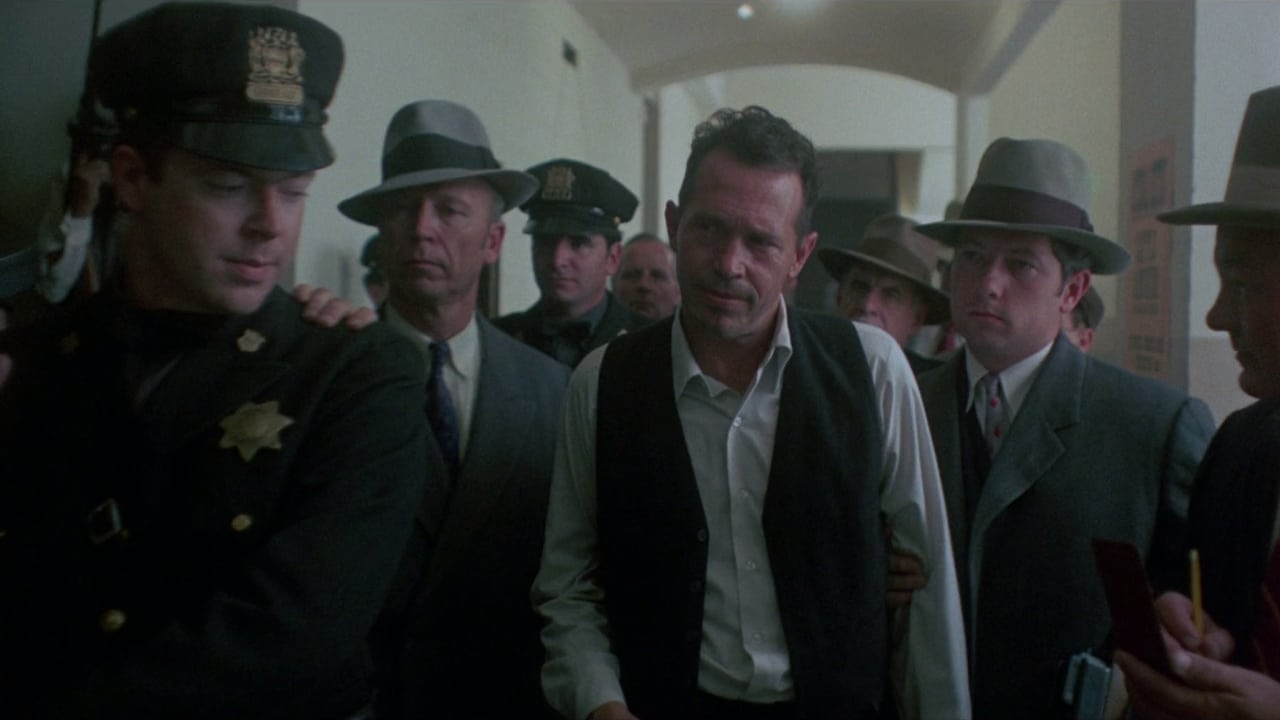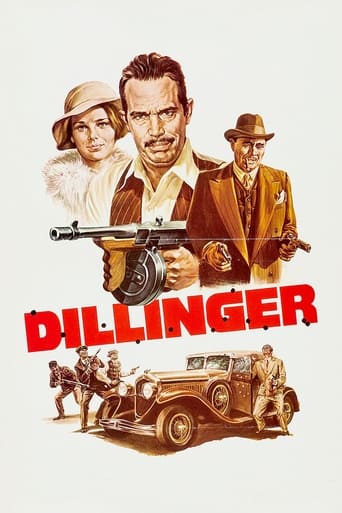

Dillinger is another example of great 70's American filmmaking. This is a well made pic and when you've got actors of great stature like Oates and Johnson, this somehow guarantees you're in for a great ride and the strong performances don't stop here. Even Dallas's Steven Kanaly as one of Dillinger's gang impresses in what is a very violent film, the likes of a similar film, Boxcar Bertha. Many films have been made of John Dillinger, this one the only one I've seen. Dillinger was one of the most feared bank robbers who just kept robbing. It was in his blood. No way in hell, could you make a guy like this stop. From the movie's start that has him robbing a teller, he pre warns the clerk, as not to get ideas, saying "This is the greatest moment in your life, don't make it your last". Oates depicts a range of emotions of the famous John Dillinger, his flaws, etc. He had a baby like nature, about him, someone who refused to grow up. The same could be said for Richard Dreyfuss who shines, in his much younger days as the smart alecky, cocky, Babyface Nelson, if stealing the scenes from the great Oates, who's performances are always of high accolade quality. Of course, it ends bloodily of course, with his execution out front of a cinema, in front of many shocked public. Dillinger openly admits how his mates wanting out careers, while he wanted to steal people's money, and here again is a prime example of how crime doesn't pay. Kanaly's running, slowly dying scene is memorable.
... View MoreThe Depression era, in which the explosive financial success Roaring Twenties sank into the pain of the Dust Bowl, not only saw more than one-fifth of the United States population losing their homes and farmlands to bank foreclosures, it also saw the rise of a particularly nasty phenomenon: the rise of gangsters of every stripe. Easily one of the most notorious of these gangsters in rural American was John Dillinger, an especially ruthless robber and murderer who, along with a group of equally notorious bank robbers like Baby Face Nelson, Harry Pierpont, Homer Van Meter, Charlie Mackley, and Pretty Boy Floyd, turned the Midwest a bloody red. Dillinger's reign of terror, of course, came to an end in 1935; but while it lasted, a lot of people died. That outlaw's life was filmed in 1973 by writer/director John Milius (his first behind the camera) for American International Pictures as DILLINGER.Warren Oates, a familiar character actor, especially in the westerns of Milius favorite Sam Peckinpah, is here put in one of his very few lead roles (the other being in Peckinpah's BRING ME THE HEAD OF ALFREDO GARCIA) as Dillinger; indeed, Oates is basically a dead ringer for the man. With a certain amount of charm, he and his boys rob banks and people left and right. And before he knows it, he has become as big a celebrity as the bank-robbing couple Bonnie And Clyde, whom he detests as "small timers" and "amateurs", earning him the sobriquet "Public Enemy #1" by the nascent Federal Bureau of Investigations. But Oates has met his match in the form of the special agent the FBI and its infamous chieftain J. Edgar Hoover has sent out, Melvin Purvis (Ben Johnson, another Peckinpah acolyte). Johnson's portrayal of the ever-ruthless Purvis is one of steely determination, one in which he intends to get revenge against Oates for having seen several of his fellow G-Men gunned down in Kansas City by Oates and his ilk. Oates, of course, isn't afraid of getting caught, since he doesn't think he will. As he tells those he robs: "This could be one of the big moments of your life. Don't make it your last." But much like the bank robbers of the Old West, and Bonnie And Clyde, Oates and his gang push their luck a little too much; and soon Floyd (Steve Kanaly), Van Meter (Harry Dean Stanton), Nelson (Richard Dreyfuss), Mackley (John Ryan), and Pierpont (Geoffrey Lewis) all bite the dust in some truly bloody shootouts with Johnson and his boys, including his trusty aide-de-camp Sam Cowley (Roy Jenson). These killings make Johnson as notorious and admired among law enforcement as Oates is with the criminal crowd. But the real prize is capturing Public Enemy #1, Mr. Dillinger; and Johnson finally gets that prize in Chicago.Even with a budget that was significantly lower than what Arthur Penn had for BONNIE AND CLYDE six years earlier, DILLINGER remains one of the most violent films of its time. And even though no slow motion is involved, as there was at the climax of BONNIE AND CLYDE, let alone for much of Peckinpah's THE WILD BUNCH, Milius makes the killings as hideous as possible. Unsurprisingly, given his reactionary politics and his love for firearms, Milius shows a lot of the artillery being used. One unique thing about DILLINGER, though, is how he doesn't choose sides: he loves both Oates' lovable (if murderous) Dillinger, and Johnson's equally steely-eyed Melvin Purvis with equal élan. The other notable thing, of course, and one thing he can't ignore no matter how much he loves guns or right-wing politics, is that the consequences of all this killing on both sides, Oates' and Johnson's alike, are corrosive and painful.While Milius is not really a director of any real renown (his penchant for injecting right-wing polemics would severely dampen his later films' impact), in DILLINGER he gets first-rate performances from all his actors; and even Phillips (as Oates' girlfriend) and Cloris Leachman are treated as more than window dressing for all the 1930s male testosterone and blood that is spread around. The period authenticity is as sharp here as it was for BONNIE AND CLYDE as is DeVorzon's score, which evokes Woody Guthrie and rural Americana much like the mix of ragtime jazz and bluegrass did for BONNIE AND CLYDE. In the final analysis, while not really a masterpiece, DILLINGER does a really good job at providing big bang for a buck, while making us realize just how bloody those big bangs and bucks came about to start with.
... View MoreThe 1973 film version of the (criminal) life of notorious bank robber John Dillinger, not really a remake of the 1945 film of the same title but a re-imagining of its eponymous character's career in crime, is hugely entertaining, featuring a star turn performance from Warren Oates that shows that the actor had major star potential, hampered, sadly, by his short stature, which doesn't really figure in the film as its director, John Milius, manages somehow to make Oates look taller than he was.Allegedly made on the cheap by American-International, it doesn't look cheap to me. It has, in its modest way, a kind of epic sweep, as we see Dillinger and his gang move through the Midwest like a tornado. The supporting roles are mostly played by young, at the time unknown players, one of which, Richard Dreyfuss, strangely well cast as Baby Face Nelson, went on to a starring career. As Dillinger's squeeze, Michelle Phillips is surprisingly effective and very sexy. There's good work, too, from Steve Kanaly and, especially, Harry Dean Stanton, who plays the most likable of the Dillinger gang.A problem I have with the film, and it's a fairly big one, is Ben Johnson's performance as FBI man Melvin Purvis. A former stunt man, Johnson became an accomplished player in western films, had a fine, mellow voice and a pleasing presence. He was not, however, a versatile actor, and this hurts Dillinger, as Johnson has the second biggest part in the film, and director Milius seems to favor him. Johnson looks his age, well past fifty at the time, and doesn't strike me as trim enough to be an FBI man. But if he was otherwise good casting this could be overlooked. Johnson simply lacks the authority, the heroic presence, to be Dillinger's nemesis, especially Dillinger as electrifying played by Warren Oates. Johnson was an actor who could steal scenes from major stars, hold his own with the best of them; and yet when "handed" scene after scene in Dillinger he just doesn't measure up. Worse, he often comes off as smug when what he should really be conveying is confidence, competence at what he does.With better casting in the Purvis role this Dillinger might have been a classic. As it is, it's excellent. The action scenes are done to perfection, nearly choreographed, I suspect, and yet they feel real none the less. There isn't a wasted moment in the film. Indeed, it could have been longer and worked just as well, maybe even better. The characters could have been more fleshed out; and some sections in the film, the one in the gang's Little Bohemia retreat in particular, could, with more time, greatly enhanced this already very well made film. John Milius was on a roll when he made this one, never fulfilled his potential. I wonder what went wrong.
... View MoreThis is still the definitive biography of John Dillinger on film. I just saw Mann's Public Enemies - this film blows that one away. Forgive me for quoting my own review of Mann's film: "Milius, taking his cue from "Bonnie And Clyde," from the earlier Lawrence Tierney film "Dillinger," and from the gaudy gangster films of Roger Corman, fashioned a film that was both flashy yet homespun, part unabashed B-movie, part evocation of American Gothic. Even his occasional tinkering with historical accuracy could be forgiven, since it was clear he had a firm grasp on what the Dillinger phenomenon was really all about - 'farm boy makes good by turning bad' is an undeniable folk-theme of American life. And the brilliance of Warren Oates' performance in the Milius film is that Oates plays Dillinger like a runaway farm-boy with a sense of humor and a quick temper, who just happened to rob banks for a living. That's as much as you can give any professional criminal without lying about the nature of crime namely, it's about stealing other peoples' money and hurting many of them in the process." Other reviewers have remarked this as a B-movie - but it is intentionally so, it never makes any pretense otherwise; and that's important: having decided to make a B-movie leaves Milius with considerable leeway as to how far he wants to push any aspect of the material. So while it's hard to think of any particular dramatic high-point of the film (perhaps the scene where Dillinger and Purvis go to the same restaurant, or the death of Pretty Boy Floyd?), it's much harder to find any moment that really drags the film down - the pacing of the film is that of a B-movie, it moves! There's nothing exceptional about the cinematography or music, or production design; what we're left with are memorable performances by some of the greatest character actors in cinema at the time, and an exciting story with enough savvy to trigger our emotions.Milius watched the Lawrence Tierney "Dillinger" and learned from it before starting this film; Mann should have watched Milius' film over and over before starting "Public Enemies." In any event, this is still THE Dillinger story, and and an entertaining action film as well.
... View More